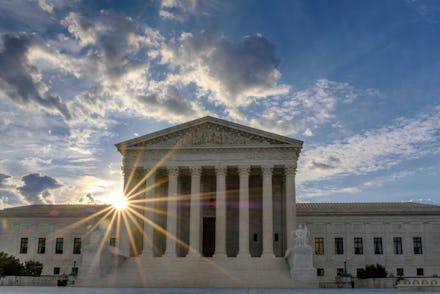Here are the key rulings from the Supreme Court's busy June term

The U.S. Supreme Court's 2016 term came to an end on Monday, wrapping up a busy month filled with potentially momentous rulings.
In its final month, the Supreme Court made key decisions about the cases the court will hear next term, including President Trump's travel ban — which the court partially reinstated — and the Colorado baker who refused service to same-sex couples. It also made decisions on the last cases of this year's term.
Here are some of the most influential rulings the Supreme Court has made since June 1, including deliberations on immigration, the First Amendment and more.
First Amendment rights
The Supreme Court made a far-reaching decision in June with its ruling on Matal v. Tam, which questioned whether current trademark law violated the First Amendment by prohibiting "disparaging" content. The court ruled against the existing regulations, asserting that its restrictions did violate freedom of speech.
In the court's written opinion on the case, Justice Samuel Alito asserted the broader scope of the court's decision regarding the censorship of "offensive" speech, writing that the current trademark regulations “[offend] a bedrock First Amendment principle: Speech may not be banned on the ground that it expresses ideas that offend.”
The First Amendment was also the focus of Packingham v. North Carolina, in which the court ruled that North Carolina's law prohibiting registered sex offenders from using social media sites violates the Constitutional guarantee of freedom of speech.
This Constitutional right, Justice Anthony Kennedy's opinion noted, ensures that Americans “have access to places where they can speak and listen, and then, after reflection, speak and listen once more.”
Immigration and citizenship
Sessions v. Morales-Santana challenged the U.S. government's current difference in treatment between unwed mothers and fathers when it comes to conferring U.S. citizenship onto their children. Under the law — which the court struck down in its ruling — mothers who are U.S. citizens have to only have spent at least one year in the U.S. for their children to become citizens, while American fathers have to have lived in the country for five years before their children are born.
The court ruled that the law's unequal protections violated the Fifth Amendment's stipulation that all people be afforded "the equal protection of the laws," and ruled that the longer residency requirement should now apply to both parents until Congress can provide a more uniform law.
The limits of citizenship were also called into question in Maslenjak v. United States, in which the court ruled that immigrants who become U.S. citizens cannot have their citizenship revoked if they make false statements that are immaterial to the terms of their citizenship.
Public funds for religious organizations
In Trinity Lutheran Church of Columbia, Inc. v. Comer, the court ruled in favor of a Missouri church that disputed the fact that it was denied public funds to renovate its playground's surfacing because it is a religious institution. In a 7-2 decision, the court ruled that the church should not be denied funds solely because of its religious status, and that doing so would violate the free exercise clause of the First Amendment.
Though Chief Justice John Roberts wrote in the court's opinion that Missouri's policy denying the funding would have only resulted in "a few extra scraped knees," the court's decision could have far-reaching consequences. "School choice" proponents are celebrating the decision, as the ruling could be used to justify using public school vouchers for private religious schools.
Challenging governmental actions
The North Carolina government was taken to task once again by the Supreme Court in North Carolina v. Covington, which concerned the state's allegedly unconstitutional race-based gerrymandering. Though the court did not officially issue a decision in the case, sending it back to the lower court to conduct a new hearing, the court did affirm the lower court's ruling that the gerrymandering was unconstitutional.
A more favorable governmental ruling was granted in Ziglar v. Abbasi, a lawsuit against several Bush-era federal officials regarding their mistreatment of primarily Muslim detainees who had no ties to terrorism in the aftermath of September 11.
The court ruled that the officials could not be sued, and that such charges should be brought up by Congress, rather than the courts — a decision, SCOTUS Blog noted, that may now make it harder for individuals to sue government officials for alleged unconstitutional conduct in the future.
Same-sex parents
The Supreme Court re-affirmed its 2015 ruling on marriage equality in Pavan v. Smith, using the previous ruling as a basis to overturn a lower court's decision and assert that Arkansas birth certificates for children of same-sex parents must list both parents' names.
The ruling came in response to a lawsuit by two married, same-sex female couples who conceived children using an anonymous sperm donor. In both cases, only the birth mother was listed on the birth certificate, and not her female spouse. As heterosexual spouses who aren't the child's biological parent are listed on Arkansas birth certificates, the court ruled the omission was unlawful.